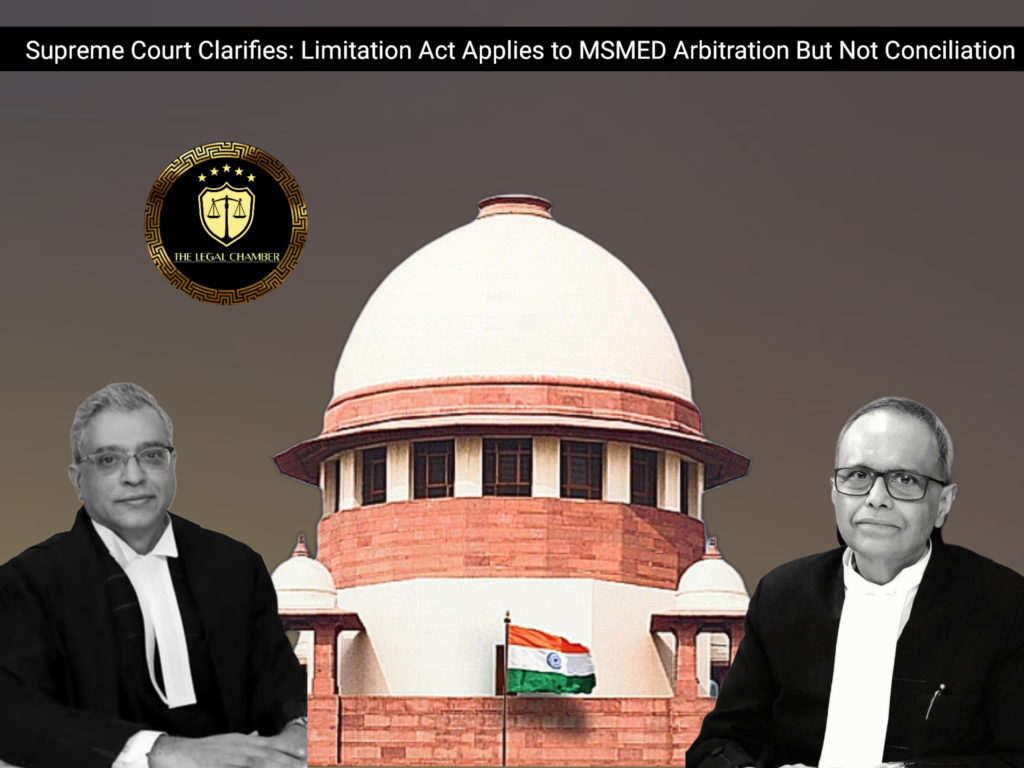
The Supreme Court ruled on the applicability of the Limitation Act, 1963, to conciliation and arbitration proceedings under Section 18 of the MSMED Act, 2006. It held that the Limitation Act does not apply to conciliation proceedings, allowing time-barred claims to be referred for settlement. However, the Act applies to arbitration proceedings under Section 18(3), as Section 43 of the Arbitration and Conciliation Act, 1996, incorporates the Limitation Act into such arbitrations. The Court emphasized that the MSMED Act’s provisions override general laws, ensuring a balanced approach to dispute resolution while protecting suppliers’ rights. The disclosure of unpaid amounts in financial statements under Section 22 may extend limitation periods, subject to case-specific scrutiny.
Facts Of The Case:
The appellants, M/s Sonali Power Equipment Pvt. Ltd., were small-scale industries registered with the District Industries Centre, Nagpur. They had supplied transformers to the Maharashtra State Electricity Board (respondent) under various purchase orders between 1993 and 2004. Due to delayed payments, the appellants filed references before the Industry Facilitation Council under the Interest on Delayed Payments to Small Scale and Ancillary Industrial Undertakings Act, 1993 (repealed and replaced by the MSMED Act, 2006). The Facilitation Council, under the MSMED Act, allowed the claims and awarded interest in 2010. The respondents challenged the award under Section 34 of the Arbitration and Conciliation Act, 1996, and the Commercial Court set it aside, holding the claims were time-barred. The appellants appealed to the High Court, which referred the matter to a larger bench. The full bench ruled that the Limitation Act applies to arbitration under the MSMED Act but not to conciliation. The appellants then approached the Supreme Court, arguing that the Limitation Act should not apply to either proceeding. The Court upheld the applicability to arbitration but held that time-barred claims can be referred to conciliation, as it is a non-adjudicatory process aimed at settlement.
Procedural History:
The case originated when M/s Sonali Power Equipment Pvt. Ltd. filed claims before the Industry Facilitation Council under the repealed Interest on Delayed Payments to Small Scale and Ancillary Industrial Undertakings Act, 1993, which were later governed by the MSMED Act, 2006. The Facilitation Council ruled in favor of the appellants in 2010, awarding delayed payments with interest. The respondents challenged this award under Section 34 of the Arbitration and Conciliation Act, 1996, before the Commercial Court, which set aside the award in 2017, holding the claims were time-barred. The appellants then appealed to the Bombay High Court under Section 37 of the Arbitration Act. A division bench referred the matter to a larger bench due to conflicting interpretations. The full bench of the High Court, in its 2023 judgment, held that the Limitation Act applies to arbitration under the MSMED Act but not to conciliation. Dissatisfied, the appellants approached the Supreme Court, which partly allowed the appeal, affirming the High Court’s view on arbitration but ruling that time-barred claims can be referred to conciliation, as it is a settlement-oriented process. The Supreme Court’s judgment clarified the interplay between the MSMED Act, the Arbitration Act, and the Limitation Act.
READ ALSO :Landmark Ruling: Supreme Court Ends Gender Bias Tribal Women Now Have Equal Rights to Ancestral Property!
Court Observation:
The Supreme Court made several key observations while adjudicating the dispute. It emphasized that conciliation under Section 18(2) of the MSMED Act is a non-adjudicatory, settlement-oriented process distinct from arbitration, and thus the Limitation Act does not apply to such proceedings. The Court noted that while limitation bars judicial remedies, it doesn’t extinguish the underlying debt, allowing parties to voluntarily settle time-barred claims through conciliation. Regarding arbitration under Section 18(3), the Court observed that the statutory fiction created by the MSMED Act makes the entire Arbitration Act applicable, including Section 43 which incorporates the Limitation Act. It clarified that Section 2(4) of the Arbitration Act (excluding statutory arbitrations from limitation provisions) yields to the special mechanism under the MSMED Act due to its overriding effect under Section 24. The Court also distinguished its earlier judgment in V.R. Kalliyanikutty, noting that coercive recovery mechanisms differ fundamentally from consensual conciliation processes. Importantly, it recognized that while Section 22 of the MSMED Act mandates disclosure of unpaid amounts in financial statements, whether this constitutes acknowledgment of debt under Section 18 of the Limitation Act must be determined case-by-case. The judgment balanced the MSMED Act’s objective of protecting suppliers with the need to prevent abuse through stale claims.
Final Decision & Judgement:
The Supreme Court partly allowed the appeals, upholding the High Court’s decision regarding arbitration proceedings while modifying its ruling on conciliation. The Court held that the Limitation Act, 1963 applies to arbitration proceedings under Section 18(3) of the MSMED Act, 2006, as the provisions of the Arbitration and Conciliation Act, 1996 (including Section 43 which incorporates limitation principles) govern such arbitrations through statutory fiction. However, it set aside the High Court’s view regarding conciliation, ruling that the Limitation Act does not apply to conciliation proceedings under Section 18(2) of the MSMED Act, and time-barred claims can be referred for conciliation as it is a non-adjudicatory settlement process. The Court clarified that while the limitation period may have expired for judicial remedies, the underlying debt remains legally recoverable through voluntary settlement. It also maintained that entries in financial statements under Section 22 of the MSMED Act may potentially extend limitation periods under Section 18 of the Limitation Act, but this requires case-specific examination. The judgment balanced the MSMED Act’s protective objectives with the principles of limitation law, ensuring suppliers retain access to conciliation while maintaining temporal limits on arbitral claims. No costs were awarded, and all pending applications were disposed of accordingly.
Case Details:
Case Title:M/s Sonali Power Equipment Pvt. Ltd. vs. Chairman, Maharashtra State Electricity Board, Mumbai & Ors. Citation:2025 INSC 864 Civil Appeal No.:Civil Appeal Nos. 9524-9532 of 2025 Date of Judgment:July 17, 2025 Bench/Justices: Justice Pamidighantam Sri Narasimha & Justice Joymalya Bagchi
Download The Judgement Here